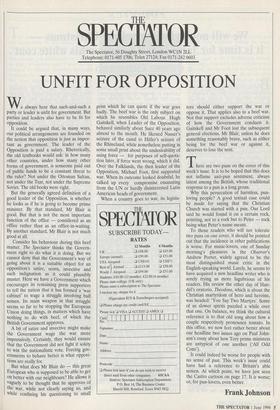SPECIATOR
The Spectator, 56 Doughty Street, London WC1N 2LL Telephone: 0171-405 1706; Telex 27124; Fax 0171-242 0603
UNFIT FOR OPPOSITION
We always hear that such-and-such a party or leader is unfit for government. But parties and leaders also have to be fit for Opposition.
It could be argued that, in many ways, our political arrangements are founded on the notion that opposition is just as impor- tant as government. The leader of the Opposition is paid a salary. Rhetorically, the old textbooks would ask: in how many other countries, under how many other forms of government, is someone paid out of public funds to be a constant threat to the ruler? Not under the Ottoman Sultan, not under the Tsar, not under the Supreme Soviet. The old books were right.
But the generally agreed definition of a good leader of the Opposition, is whether he looks as if he is going to become prime minister. By that standard, Mr Blair is good. But that is not the most important function of the office — considered as an office rather than as an office-in-waiting. By another standard, Mr Blair is not much good at all.
Consider his behaviour during this beef matter. The Spectator thinks the Govern- ment right to do what it is doing. But we cannot deny that the Government's way of going .about it is a suitable object for an opposition's satire, scorn, invective and such indignation as it could plausibly muster. Here we have a Government which encourages its remaining press supporters to tell the nation that it has formed a 'war cabinet' to wage a struggle involving bull semen. Its main weapon in that struggle seems so far to be stopping the European Union doing things, in matters which have nothing to do with beef, of which the British Government approves.
A bit of satire and invective might make the Government wage the war more impressively. Certainly, they would ensure that the Government did not fight it solely to win the nationalistic vote. Forcing gov- ernments to behave better is what opposi- tions are really for. But what does Mr Blair do — this great European who is supposed to be able to get on better with our neighbours? He allows it vaguely to be thought that he approves of the war, while not clearly saying so, and while confining his questioning to small print which he can quote if the war goes badly. The beef war is the only subject on which he resembles Old Labour. Hugh Gaitskell, when Leader of the Opposition, behaved similarly about Suez 40 years ago almost to the month. He likened Nasser's seizure of the canal to Hitler's seizure of the Rhineland, while nonetheless putting in some small print about the undesirability of using force — for purposes of self-quota- tion later, if force went wrong, which it did. Over the Falklands, the then leader of the Opposition, Michael Foot, first supported war. When its outcome looked doubtful, he talked up every compromise emanating from the UN or hardly disinterested Latin American heads of government. When a country goes to war, its legisla- tors should either support the war or oppose it. That applies also to a beef war. Not that support excludes adverse criticism of how the Government conducts it. Gaitskell and Mr Foot lost the subsequent general elections. Mr Blair, unless he does something reasonably brave, such as either being for the beef war or against it, deserves to lose the next.
There are two puns on the cover of this week's issue. It is to be hoped that this does not inflame anti-pun sentiment, always latent among the British, whose traditional response to a pun is a long groan.
Why this persecution of harmless, pun- loving people? A good textual case could be made for saying that the Christian Church was started with a pun. Our Lord said he would found it on a certain rock, pointing, not to a rock but to Peter — rock being what Peter's name meant.
To those readers who will not tolerate two puns on one cover, it should be pointed out that the incidence in other publications is worse. For music-lovers, one of Sunday morning's pleasures is the Observer's Andrew Porter, widely agreed to be the most distinguished music critic in the English-speaking world. Lately, he seems to have acquired a new headline writer who is sorely trying us more lugubrious of his readers. His review the other day of Han- del's oratorio, Theodora, which is about the Christian martyrdom of hero and heroine, was headed: 'You Say Two Martyrs'. Some of us slower spirits puzzled a while over that one. On balance, we think the cultural reference is to that old song about how a couple respectively pronounce tomato. In this office, we now feel rather better about our headline two issues ago on Paul John- son's essay about how Tory prime ministers are untypical of one another ('All Odd Cons').
It could indeed be worse for people with no sense of pun. This week's issue could have had a reference to Britain's able semen. At which point, we have just seen the Castro cartoon on page 17. It is worse; or, for pun-lovers, even better.
Frank Johnson


























































 Previous page
Previous page